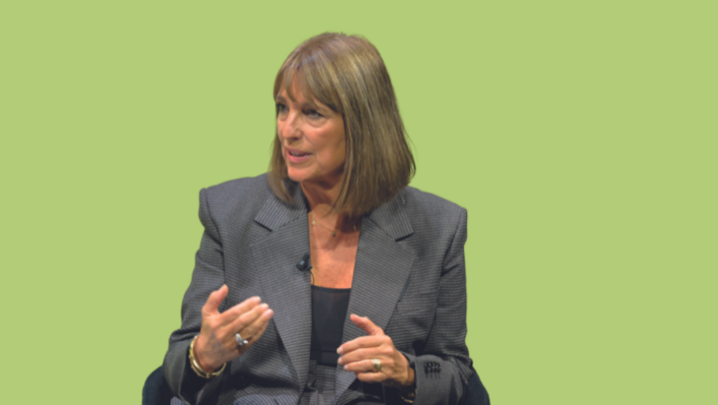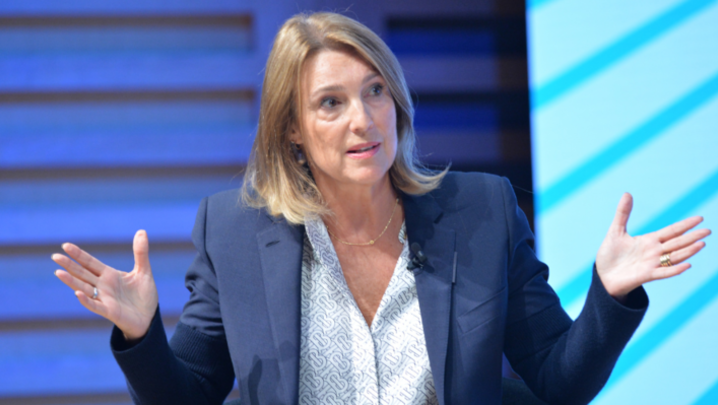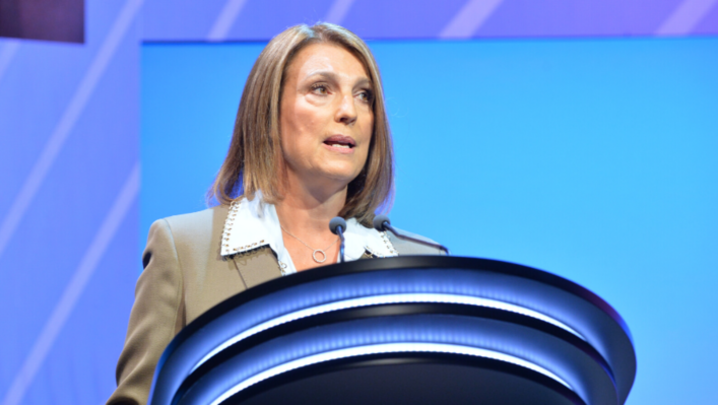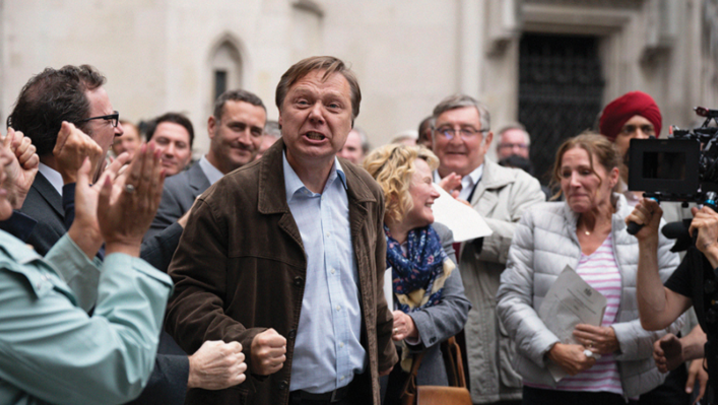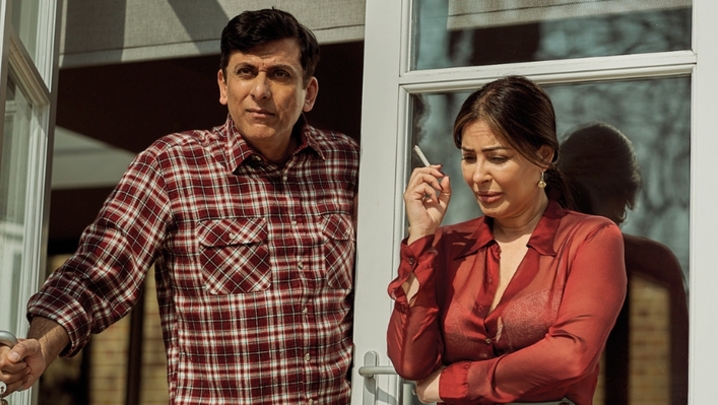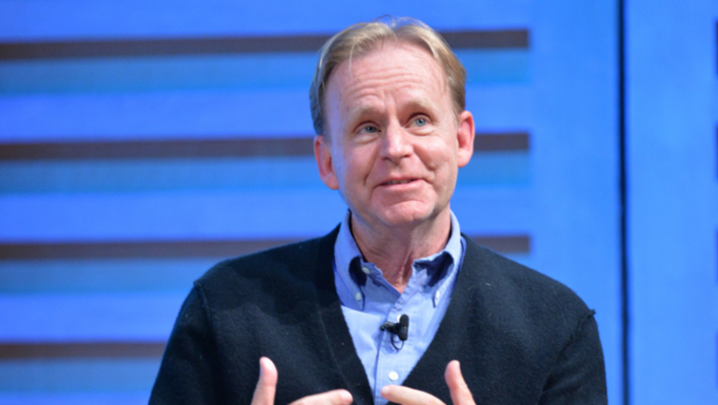ITVX is on a roll and advertising is recovering… but the broadcaster’s CEO is not resting on her laurels
ITV’s digital transformation. The ever-changing nature of advertising. The ethics of Ed Balls interviewing his wife, Home Secretary Yvette Cooper, on Good Morning Britain: these were some of the topics discussed when Amol Rajan interviewed ITV CEO Carolyn McCall.
Two years ago, the pair were on the same stage, discussing the then soon-to-be launched streaming service, ITVX; this year, McCall reported viewer growth for the platform at 26%, with 1.5bn streams and monthly users up by 3m to 15m. She said: “ITVX has been a success. For me, the most important thing is that we’re getting more frequency, so more people are coming more often to ITVX… 90% of people that come will go on and watch something else.
“The market is better. But more importantly, I think we have really transformed the business. And we’ve got so much more to do – we’re only 30% to 40% of the way in.”
Yet things have not been easy in the past two years. “It has been tough,” said McCall, especially for independents and free-to-air broadcasters such as ITV. She does not like the term “market correction” to describe 2023 – a year hit by the US writers’ and actors’ strikes, and European broadcasters “commissioning less content because they were looking at protecting their profits, because they had to”.
“But, actually, 2023 was still a higher year in terms of revenue than 2019 for production,” she pointed out.
ITV was also affected by the cost-of-living crisis. McCall said: “Linear advertising is deeply tied to the economy and it is cyclical.” As the economy has improved so has the market: “This year is still not easy – nothing is easy – but the ad market has recovered. Talking to a lot of my counterparts in Europe – TF1, RTL all of them – they’re finding it much easier, and they’re all talking about commissioning.”
ITV has diversified to make itself less dependent on advertising. McCall said: “By 2026, we’re pretty confident that two-thirds” of ITV’s revenue “will come from digital and studios”.
“It has been a marked shift… this was all about strategically ensuring we were not wholly dependent on linear advertising. Our whole strategy [is] to diversify away from that, expand studios, get the right kinds of companies into the portfolio of studios and, obviously, digital businesses.”
Has the story been sufficiently appreciated by the stock market, asked Rajan. It is tough for UK-based consumer businesses in the City, McCall replied: “We’re a bellwether… because we take so much money from advertising. Our shareholders believe the story… but sometimes the market is impatient.
“Everyone wants transformation to happen in about five days. Actually, it takes much longer than that.”
Part of the transformation has included efficiencies and “headlines about how you’ve cut 200 roles earlier this year”, said Rajan, to which McCall responded: “That is because we’re facing into the future and we’re having to look at everything we do.
“We want to be around for the next 70 years and thriving. If we stay as we are, we’re not going to do that. We have to look at everything all the time.”
Rajan asked McCall: “You shut CITV.… Are you currently looking at shutting down any other channels?”
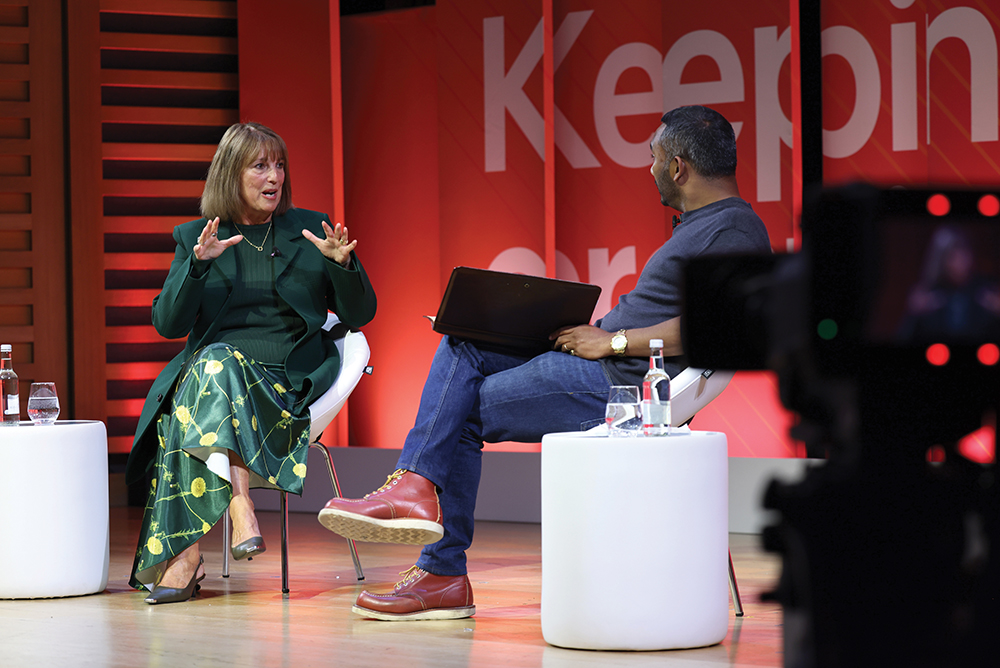
McCall said the children’s channel “just didn’t make sense… with a lot of stuff being done online”, adding: “I don’t have an answer. We are not planning to shut any [more channels] but we’re going to have to keep that under review.”
Some channels might not rate highly but “they might be doing something different for us. That’s fine… it’s very important we don’t only do things for profit [though] we are a commercial PSB... We don’t get a cheque at the beginning of the year,” she said, looking pointedly – to audience laughter – at the BBC presenter.
Rajan wondered, after Ofcom received 16,000 complaints about Balls co-interviewing Cooper on GMB in early August: “How can anyone take ITV seriously on impartiality when you’ve got a former Labour cabinet minister interviewing his wife?”
McCall said the Home Secretary unexpectedly agreed to appear on the show at short notice due to the summer riots in Britain. She said Ofcom was not pursuing viewers’ complaints.
“Would we do it again? No. But was it impartial, fair and balanced and did they behave professionally? Yes.”
Rajan asked about the impact for ITV of the Government’s ban on adverts for junk food before 9.00pm from October 2025. McCall replied: “Ninety-five per cent of adults watch ITV, kids are on YouTube… the demographic trends are that TV doesn’t attract kids [aged] 16-to-25, they’re not on TV much. They will come for the odd shows, [but] you can’t have it both ways.
“We’ve done loads of research that says this is not going to make a dent in childhood obesity. But it is a political thing, so we’re going to have to mitigate it in any way we can.”
Its impact will cost ITV “millions and millions of pounds” which “might affect the content market and the way we do some other things, including events.”
Mr Bates vs the Post Office has given ITV its biggest hit since McCall arrived. This year it won three National TV Awards. But because of its UK-centric subject, it’s unlikely to be a global moneyspinner, said Rajan.
This prompted a discussion about how advertising is changing in the context of ratings for catch-up and on-demand services.
McCall explained: “Mr Bates started at 4 million and ended at 15 million per episode. And every single one of our top dramas... were around 4 million on the overnights … and they all tripled or doubled in size in 28 days.
“And you can monetise that now. It’s not just about on linear. It’s also about what you are going to get on VoD. I think the way to look at ratings should be very different, both from the production industry, and obviously with advertisers.
“Advertisers have got to start changing quite dramatically the way they actually look at how they pay for that. They shouldn’t just be paying for C7 [the first seven days]. It means you look at 28 days [as] people are [still] watching it… you’re still giving them audience, you’re still giving them great context.”
Session Nine: ‘UK keynote, Carolyn McCall’. The ITV CEO was interviewed by journalist and presenter Amol Rajan. The producer was Sue Robertson. Report by Tara Conlan.


